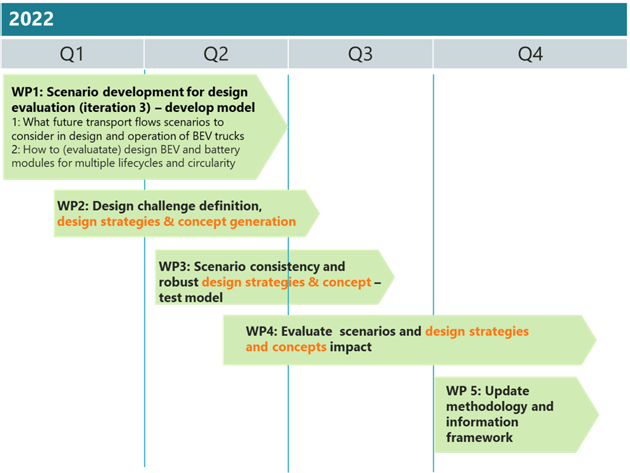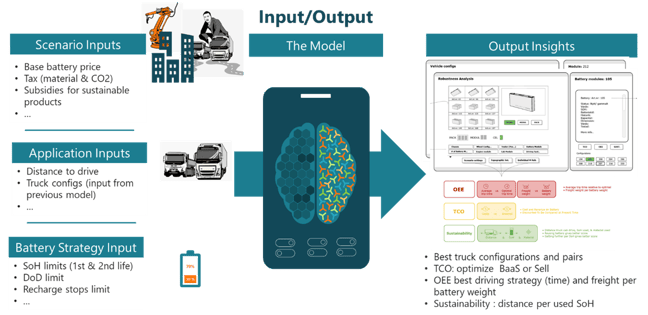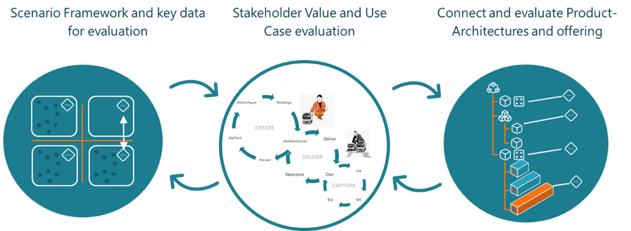What is the Project About?
This project explores scenarios for changing and diverse future urban and inter-urban area transportation. Our research will evaluate alternative innovative and sustainable mobility solutions to support the innovation process, including platform development, product planning, modularization, circular economy, and design thinking.
The project scope—mobility use cases and product systems of interest—is focused on electrified trucks, specifically their power infrastructure and batteries.
What Are We Trying to Achieve?
The targeted result is a systematic method by which future scenarios can be used in the (platform) design and innovation process. The method builds on results from our earlier research and projects (linked below) which includes a model to assess and evaluate modular design concepts and enabled configurable products.
The model created earlier (Bodén and Björkvall) evaluate performance across multiple future scenarios on a vehicle level. This project targets to develop the model in three directions:
- What changes and scenarios for road-based freight industry and goods flows shall we explore?
- How usage of batteries, lifecycles, and circular business models for battery modules may impact truck performance?
- How to apply modularization and design thinking methods for future resilience in organizations and modular concepts?
Combined, feedback loops can be established, to continuously improve how design and modular concepts can be evaluated for future performance and resilience. Design thinking and visualization will, in combination with the logical and analytical model, help clarify key challenges, provide insight and understanding, identify areas for testing and serve stepwise integration in our methods and tools.
Who Are “We"?
Modular Management conducts research in collaboration with its clients and partners. In this project our partners are connected mostly by Center for ECO2 Vehicle Design at the Royal University of Technology, (KTH) in Stockholm. The center joins vehicle industry and academia partners to share and do research. A unique center perhaps, as it links technology challenges across rail and road, as well as head-to-head competitors like VOLVO and SCANIA. Besides the value of all partners’ expertise in vehicle design and mobility systems, Modular Management is among friends of modularity. This team is ready to leverage decades of know-how from optimizing their modular machinery, to transform mobility from the engine of a fossil fuel economy to the electrified and sustainable (modular) futures.
In practice, this project is the work of Rikard Bodén, Arne Erlandsson and Colin de Kwant at Modular Management. But contributors and partners are many, and worth our gratitude and recognition: Gunnar Björkman and Håkan Björklund at VOLVO Technology, Matilda Henriksson, Sandra Molander and Charlotta Sahlin at Yovinn and Pollen in Göteborg, Adam Wiberg and Johan Andersson at KTH, Britan Kilic at Örebro University, Lars Uppvall at KTH and Claudia Andruetto at the Integrated Transport Research Lab, (ITRL) at KTH.
Background
Predicting future market directions is challenging, particularly for industries subject to significant disruptive change and unpredictable megatrends. Failing to timely prepare organizations, modular architectures, and products for future change, as well as failing to achieve sustainable development goals will cause substantial losses for businesses, societies, and the environment.
One such industry facing substantial transformative pressure to meet sustainable development goals, in addition to rising demand, urbanization, environmental standards, and technological change is the market for road transportation and commercial vehicles (truck) industry. Road transport is a key source of CO2 emissions and political pressure for transformation on truck manufacturers has increased with a first-ever EU-wide regulatory framework to reduce CO2 emissions (EU regulation 2019, EC Climate Action 2022). Industry’s response, meanwhile, indicates the approaching tipping point towards electrification, as manufacturers jointly commit to enabling a zero-carbon road freight economy (acea.auto 2020; sciencebasedtargets.org).
The transformation to electric mobility is undeniable and introductions of electric or other non-fossil-fuel mobility alternatives are fast-paced. In the transformation, manufacturers and researchers often link sustainability and electrification but also megatrends such as digitalization, circular economy, and automation of vehicles, fleets, and transport services. Combining such a myriad of trends, challenges and deep uncertainty can be called a “wicked problem” in the field of futures studies, scenarios, and strategic planning. Techniques in futures studies and scenario-based planning best suited to deal with the deep uncertainty of mentioned “wicked problems” belong to the exploratory and normative or backcasting type scenarios. A useful scenario framework developed earlier (Pernestål et al.) was adopted as the basis for our research and augmented along the way with insights gained through our interviews and exchanges with experts from the vehicle industry, transportation service providers, and governmental institutions.
Earlier research found scenarios like these are being used in corporate and strategy-level activities, yet are largely unused or poorly integrated into the downstream innovation and development process (see links: Eriksson and Simme 2020). Scenarios mostly terminate at a communication, strategic, or planning level, without an information modeling framework that enables the iterative and concurrent design of subsystems or assessing fulfillment or validity of performance goals or resilience of architectures over time.
What is the Status of the Project?
WP1, WP2, and WP3 have been completed as planned. WP4 and WP5 have started and will evolve as we finalize the end of 2022, and conclude recommendations toward BEV design strategies, concepts in relation to circular business models, modularization, as well as digitalization, and sustainability.

Orange highlighted work packages indicate topics central to the collaboration between Modular Management and Yovinn: concept generation, clarification, and evaluation using visualization and design thinking techniques.
How Does the Project Follow the Time Plan?
The project is progressing well. The workload and capacity have varied as usual, but the overall time plan is intact. Three master thesis works were conducted and completed during Q1-Q2.
As part of our research, we have engaged with various organizations, companies, and industry professionals to further our research. Workshops were held in Stockholm and Göteborg during this timeframe. As well as bi-weekly meetings to guide and connect the different activities. We were able to connect with other research through our Eco2 research center, gaining new insights and possible future research input. A final analysis focused on change and transformation management, in connection with the future scenarios on digitalization and sustainability, is being conducted in collaboration with final year Industrial Management students at KTH. About 20 students are engaged in this analysis. VOLVO Technology and KTH Integrated Transport Research Lab (ITRL) support us with an ongoing dialogue between the students by providing technical knowledge as needed. Additionally, we organized an exclusive Q&A with Leif Östling in which he shared experiences and ideas connecting Scania’s modularization journey with the challenges truck manufacturers have and will face, and why Sweden has been a pioneer. We are now finalizing the remaining activities, planning a final workshop in Göteborg soon, and scoping the next master thesis assignments. We are confident we can continue and finalize the project as planned.
Achievements and Insights
Literature studies, interviews, and workshops augmented our future transport scenarios and evaluation models from preceding projects with trends and insights for the ownership, operation, and design of heavy duty BEVs and their batteries (WP1-2).
Evaluations of BEV usage and circular business model strategies and scenarios are enabled, using a second analytical model with the output of the earlier developed model (WP3).

Stakeholders throughout the design and operating lifecycle for such trucks and their batteries have been identified, leading also to new insights on key variables for the design and operation of sustainable, effective transport solutions and vehicles. New and broader applications, new research questions, and stakeholders for future research are being formulated (WP4).
The result: a scenario adaptive platform design methodology, including logical and analytical model and scenario framework for evaluations of architectures, product systems, and strategies is being summarized and made presentable for stakeholders (WP5).

Want to know more?
If you’d like to learn more about our research, feel free to message me using the contact information below or use our contact form. Additionally, we will be hosting a webinar on this topic on February 21st, 2023. Register here.
 AUTHOR
AUTHOR
Colin de Kwant
Consultant
+46 736 20 11 31
colin.dekwant@modularmanagement.com
Publications and links
Colin de Kwant et al. - The role of product design in circular business models: An analysis of challenges and opportunities for electric vehicles and white goods
Linda Eriksson and Lina Simme -The Application of Futures Studies in Innovation Processes https://www.modularmanagement.com/blog/futures-studies-in-innovation-processes
Anna Pernestål et al. - How Will Digitalization Change Road Freight Transport? Scenarios Tested in Sweden
Rikard Bodén, Simon Björkvall - Sustainable mobility scenario modeling — Evaluating future resilience of modular concepts for electrified trucks
Colin de Kwant, Rikard Bodén, Arne Erlandsson - Sustainable mobility scenario modeling — Evaluating future resilience of modular concepts for electrified trucks
Britan Kilic - Future changes in the road freight transportation industry: An application of future scenarios
Adam Wiberg, Johan Andersson – Evaluating Business Models and Battery Usage in Battery Electric Trucks: : A Simulation Model for Future Scenarios (diva-portal.org)


